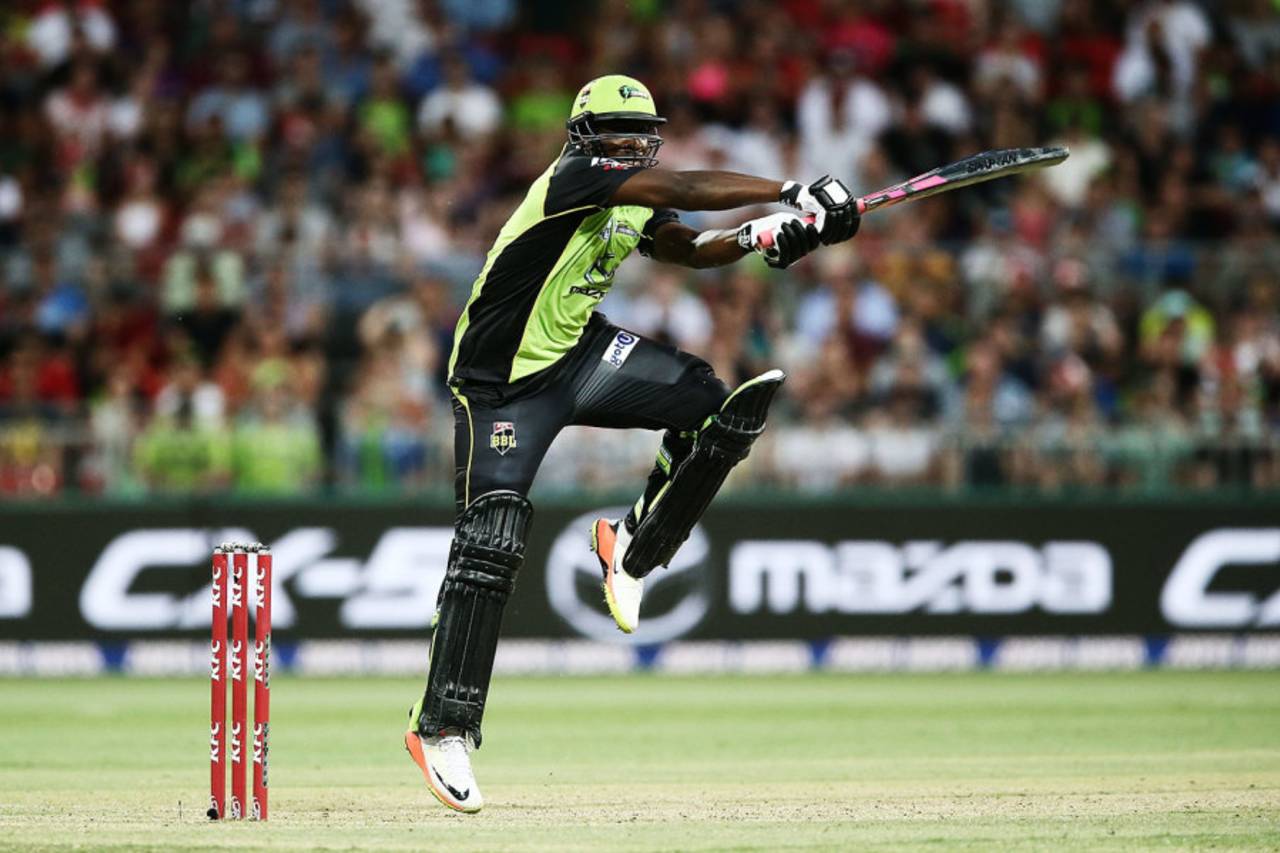Cricket West Indies urges caution against 'doomsday' T20 scenario
CWI wants the ICC to address the possible eventuality that international bilateral cricket will be cannibalised by T20 leagues
Nagraj Gollapudi
06-Mar-2018

Andre Russell swats one through the off side • Cricket Australia/Getty Images
Cricket's doomsday scenario, where domestic T20 leagues wipe out international matches, has become the subject of a discussion paper prepared by Cricket West Indies (CWI), ostensibly on the evolution of Twenty20 and how international cricket and boards risk being run over if checks are not put in place.
In the paper, seen by ESPNcricinfo, CWI highlights an "urgent" need for boards to review no-objection certificates (NOCs) given to players, allowing them to play in overseas T20 leagues. Without such a measure, CWI argues, international cricket will be in "jeopardy" because boards will not have the financial muscle to sustain, protect and develop the game.
CWI created the paper on its own initiative and hoped it would be discussed by the ICC Board in February. However, the ICC board felt that the better forum to present the paper to would be the chief executives' committee, which will meet late April in Kolkata at the ICC's next round of quarterly meetings.
It is understood that CWI had initial discussions with CA, ECB and the Federation of International Cricketers Association (FICA), and plans to consult other boards and ICC management ahead of the April meeting.
CWI's primary concern is the overlap between bilateral international cricket and T20 leagues, which now fill up majority of the year. West Indies have been affected most because the best of the talent in the Caribbean has opted to play in these leagues, often giving up national contracts offered by CWI. Recently Sunil Narine, Kieron Pollard, Andre Russell and Darren Bravo opted to participate in the Pakistan Super League instead of playing for West Indies in the World Cup qualifiers.
However, CWI reckons the problem is spreading. It includes a host of South African players led by fast bowler Kyle Abott and batsman Rilee Rossouw, who have taken the Kolpak route to emigrate to England and given up their international career (though South Africa's transformation policies are a specific spur). Last year New Zealand fast bowler Mitchell McCleneghan turned down a NZC contract. Most recently, England's Adil Rashid and Alex Hales turned down red-ball contracts with their respective counties in favour of white-ball only deals. JP Duminy retired from Test cricket, wanting to focus on his white-ball skills. Even AB de Villiers played in the IPL last year but skipped a Test series in England.
The scheduling overlap, argues CWI, means players have to choose between international matches and T20 leagues and some have become free agents to "varying degrees" at the cost of their national teams.
Free agency has affected West Indies "acutely" because at least five overseas T20 leagues - BPL, BBL, PSL, New Zealand's Super Smash, and South Africa's T20 tournament - overlap with the Caribbean home season between October and March. The Afghanistan Premier League will start later this year as well.
CWI has been in an ongoing tussle with players over the NOC. A couple of years ago, the board controversially decided to impose a levy on Kieron Pollard, who was seeking an NOC to play in the South African domestic T20 tournament. At the time, Cricket South Africa along with CA and FICA slammed CWI, calling the decision a restraint of trade.
CWI said such an environment produced animosity because, "boards see players as disloyal for choosing to participate in overseas domestic leagues rather than in international or domestic home cricket, and players see boards as trying to unfairly restrict their movement and earning capacity."
To resolve this issue, CWI recommended a review of the NOC system. "A review of the NOC system is essential as part of an integrated plan to mitigate the harm to the health of the game in many parts of the world due to the runaway success of T20 franchise-based leagues and to find a solution that addresses the concerns of both players and administrators.
"Their recent explosion and the associated T20 player drain and financial impact Home Boards suffer has made this an urgent issue. Without such review, the future of international cricket is in jeopardy as member boards will not have the financial wherewithal or sporting resource to continue to invest in, protect and develop the game in those home countries, and to provide the support they provide for the cricket fraternity."
Another controversial recommendation from CWI is for the host board of the T20 league to compensate other boards by paying a 30% NOC release fee for allowing their players to participate in the tournament. And in cases where the T20 league is operated by a third party, the league owners must pay a certain fee to the ICC and the Associate country where it is being held. That money then should be pooled in for the development of the cricket.
Nagraj Gollapudi is a senior assistant editor at ESPNcricinfo